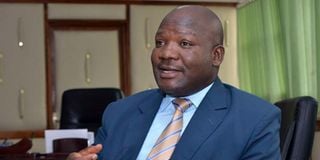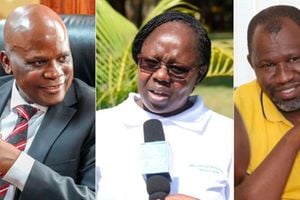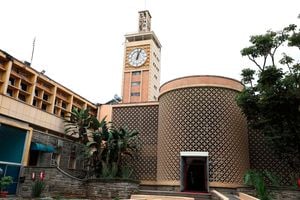
Kakamega Governor Fernandes Barasa.
A stalemate is looming between the national government and county governors over revenue sharing and late disbursement of National Treasury funds to counties.
County leaders have warned that critical county services could grind to a halt as a result of the withdrawal of the 2024 Finance Bill and the delayed monthly disbursement of funds.
National Treasury has proposed cutting Sh20 billion from the agreed Sh400.1 billion earmarked for counties in the 2024/2025 financial year as part of its plan to address cash flow challenges.
The governors are adamant that they will not accept an allocation less than the Sh400 billion approved by the Division of Revenue Allocation and the Senate.
The county bosses argue that any shortfall in the national allocation must be borne by the national government as stipulated in Section 5 (1) of the Division of Revenue Act (DoRA), 2024.
Council of Governors (CoG) Finance Committee Chairman, Fernandes Barasa, said the governors had agreed to reject the equitable share allocated to the devolved entities in the 2024/25 financial year if the Sh20 billion was reduced.
"We agreed to reject the proposal to slash Sh20 billion from the money allocated to counties and this remains our resolve. The move by the National Treasury is affecting the delivery of services at the grassroots level and is an outright clawback on devolution," said Mr Barasa.
He questioned the criteria behind the retention of the Sh20 billion even after a mediated process.
Mr Barasa spoke at the Kakamega County General Hospital when he inspected a Sh60 million consignment of non-pharmaceuticals and drugs purchased by the county government from the Kenya Medical Supplies Authority (Kemsa).
He said the health sector was facing funding challenges at county level, causing immense suffering to patients seeking medical services.
"The Exchequer needs to understand the needs of Kenyans at the local levels and plan well so that the funds are released to the counties on time to enable us to meet our obligations, especially in healthcare and payment of salaries for county staff," said Mr Barasa.
In response, the governors now want the DoRA, 2024 to be operationalised in the absence of the County Allocation Revenue Act (CARA), which is yet to be tabled in the Senate to allocate funds to the counties.
Section 3 of the Bill contains the objects and purpose of the Bill, which is to provide for the allocation of national revenue for the financial year 2024/25 and the transfer of county allocations from the Consolidated Fund to the respective county revenue funds.
In the absence of CARA, which provides for the horizontal equitable sharing of revenue among the 47 counties based on the third basic sharing formula, counties should base their expenditure on the DoRA.
The DoRA allocates national revenue between the two tiers of government as provided for in Article 203 of the Constitution.
The CARA, on the other hand, provides for the horizontal equitable sharing of revenue among the 47 counties based on the third basic shareable formula.
The governors have asked Parliament to fast-track the Bill which, if passed into law, will require the national government to publish monthly reports on actual transfers of all allocations to county governments based on the monthly cash disbursement schedule approved by the Senate.
The bill also outlines a formula for distributing funds among counties, taking into account factors such as population, poverty levels and infrastructure development.
This formula is intended to address economic disparities between counties.
According to the governors, the unprecedented cash flow crisis, which could be exacerbated by the proposed reduction in shareable revenue, will affect service delivery at the grassroots level.
As a result, the governors have indicated that the prevailing scenario seeks to claw back the gains made since the devolution of power in 2013 and the constitutional requirement that resources follow functions.
The county bosses have expressed their displeasure at the current situation, which is hampering the implementation of development projects within the desired timeframe and the payment of salaries.
Governor Barasa said the counties had piled up outstanding bills at Kemsa, making it difficult to procure more drugs on time.
Mr Barasa claimed that the National Treasury had developed a character of skipping two to three months before releasing the equitable share, leading to a pile-up of outstanding bills.
For example, National Treasury is yet to release funds for July to the counties, according to Mr Barasa.
He said counties were struggling because of the inconsistent disbursement patterns.







